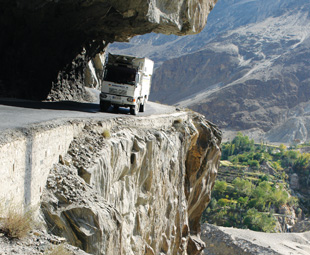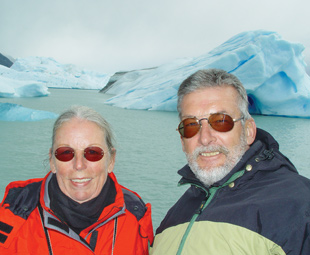Hanging with the MAN

Who needs a house when you have a truck? STUART MOIR meets two world travellers who call a Gunwiltruck “home”. At some point in our lives, we all dream of seeing the world our way. Yet often, as time passes and life happens, the dream fades. Not so with Wilfried Gosslau and his wife, Gunilla, who are proving that you are never too old to change your life and live your dreams.
It usually takes something drastic to make us realise how fragile life is. For Wilfried, it was an eye disease that brought this lesson home, leaving him blind in one eye and partially sighted in the other. Towards the end of 1995, Wilfried received even more bad news. Doctors pronounced the disease not only incurable but progressive; he would eventually go completely blind.
It was this catastrophic turn of events that put the wheels of change in motion. Wilfried and his wife decided to pack up their life in Germany and see as much of the world as they could completely free of commitments before Wilfried lost his sight. In order to do so, they sold everything they owned. Gunilla says, “We did this to be totally independent and have no ties to home, so we don’t have to worry about what’s happening while we’re travelling.”
It was Wilfried’s idea to explore the world their way. For him and Gunilla, this meant not involving travel agents or touring in groups. “Travelling in a group means you have to wait or go faster for other people; going to a travel agent limits what you see, because they will make sure you only see what they want you to see. And we want to see everything,” he explains.
This led to the birth of the Gunwiltruck, an expedition vehicle based on a MAN 4×4 truck and modified by a German company specialising in rally trucks. According to Wilfried, he and his wife chose the MAN truck because of the range of options it offers for personalising the vehicle. “Most motor homes are manufactured for a broad market, and do not take the particular and special needs of customers into consideration.”
The cabin was built by an Austrian company that specialises in expedition vehicles, although the couple was heavily involved in the final design.
 A perfect example of this in terms of the cabin is the higher roof for better sleeping arrangements. “We built the cabin taller and not longer, so we can move easily,” Wilfried explains. Another unique feature is the fitment of hot water pipes under the floor to provide warmth in wintry weather. The personalised motor home took a year to complete.
A perfect example of this in terms of the cabin is the higher roof for better sleeping arrangements. “We built the cabin taller and not longer, so we can move easily,” Wilfried explains. Another unique feature is the fitment of hot water pipes under the floor to provide warmth in wintry weather. The personalised motor home took a year to complete.
Although being able to adapt the motorised home to meet their needs was important, the couple’s main reasons for selecting the MAN brand were its reputation for reliability and the fact that it is well-known in most parts of the world. “There are lots of trucks and motor homes to choose from, but although most of these are popular in Europe, in other parts of the world it may be difficult to get spares if something goes wrong,” Gunilla says.
Wilfried is proud of the fact that he and his wife haven’t experienced any serious problems with the truck. “It’s vitally important to maintain the vehicle correctly when travelling such long distances, although this is not always possible because of the area in which you may find yourself. That’s why we try to plan our routes and stops around when and where we will need to service the truck,” he says. Of course, unforeseen situations can occasionally arise. “At times like that, we need to know how to fix the problem. That’s why we always carry a satellite phone,” adds Gunilla. The fact that the MAN truck carries 700 l of diesel, enough for approximately 2 200 km, also helps to ensure that the couple can reach civilisation when needed.
The Gosslaus carry a plentiful supply of fresh water that is filtered before use and then deposited into a waste-water tank. The water is then cleared biologically without chemicals and drained along their journey. The vehicle also carries enough propane gas to last as long as eight months depending on usage. Solar panels are positioned around the truck to charge all the batteries on board. According to Wilfried, survival is easy with all these resources at their disposal. “We do everything on the truck, including cooking and showering; there’s no reason to leave.” Of greater concern is monitoring the political situation in certain countries and knowing when to visit, as well as organising insurance and travel documents for border crossings.
Wilfried’s love of geography and studying maps has been invaluable to the couple’s safety during their adventures. “People need to know where to go, even in relatively safe areas. We haven’t had any incidents during the entire trip. We have only fond memories of the people we have met and shared our lives with,” says Wilfried. “We are safe and free. Our family knows that and we keep in contact with them regularly, but Wilfried and I are there for each other during this journey together. We only go as far as we can when we can; nothing is keeping us or pushing us along,” Gunilla adds.
With no immediate plans to finish their travels, the couple don’t give much thought to the future. Although he and his wife are not getting any younger, Wilfried and Gunilla still have their health and believe that they will need at least another five years to complete their journey. “We have a long list of doctors’ numbers, so when we go into different countries we make sure we have a doctor we can visit in case of an emergency,” Wilfried says.
When their expedition is over, the couple may decide to base themselves in Sweden where they have family, migrating south to the Cape during the European winter months. But nothing is cast in stone. For Wilfried and Gunilla, the journey is just beginning; they still have a lot of the world to see.
Published by
Focus on Transport
focusmagsa



